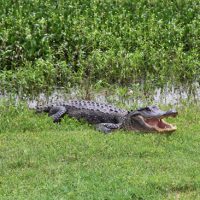How To Stay Out Of Trouble With Alligators

According to estimates from 2024, South Carolina is home to 100,000 alligators. This means that it has a much smaller gator population than Florida or Louisiana, but the population has increased remarkably since the 1970s, since the American alligator was listed as an endangered species and widespread bans on hunting the animals went into effect. Of course, the human population of South Carolina has also increased in recent years. Estate planning lawyers have started to take the attitude that South Carolina is the new Florida, an inexpensive retirement destination in the Sun Belt. This means that alligators and humans are more frequently coming into contact, especially in coastal regions of South Carolina like Hilton Head Island. Since 2000, there have been at least 21 alligator attacks on humans; most of them have not been fatal. Almost all alligator attacks are preventable. Your actions in the moment can help you avoid a close encounter with a gator, but the actions of a person or entity can also affect the chances of humans and alligators getting dangerously close to each other. If you got injured in an alligator attack at a property where alligators had easy access to humans, contact a Columbia premises liability lawyer.
Don’t Get Too Close to the Alligators’ Territory
Every alligator attack on record has occurred either when a person was swimming in a river or lake or standing or wading at the water’s edge. Avoid swimming in areas that are not designated for swimming. If you live in a waterfront property, do not get within ten feet of the water’s edge; even if you have never seen an alligator in your canal or manmade lake before, there is a first time for everything.
Alligators rarely attack humans on land. If an alligator chases you on land, run away; you can outrun it. If you fall out of a boat in alligator territory or see an alligator near where you are swimming, swim calmly and quietly to the shore without splashing and get out of the water.
Don’t Make Your Waterfront Property a Source of Food for Alligators
Alligators do not naturally think of humans as prey; in most fatal alligator attacks, the gator does not eat the person. Gators will become more aggressive toward humans if they start to expect that humans will feed them. Therefore, you should never feed alligators, as much fun as it might be to watch a gator jump out of the water to snap up a chicken bone. If you go fishing in a lake and clean the fish on your boat or by the shore, do not dump the debris in the water where alligators can get it; to a gator, this counts as you feeding them.
Let Us Help You Today
The personal injury lawyers at the Stanley Law Group can help you if you got injured in an alligator attack in South Carolina. Contact The Stanley Law Group in Columbia, South Carolina or call (803)799-4700 for a free initial consultation.
Sources:
greenvilleonline.com/story/news/local/greenville/2024/04/26/alligator-encounter-in-sc-what-to-do-when-facing-an-alligator/73466855007/
myhorrynews.com/news/local/horry_county/south-carolina-alligator-attacks-are-increasing/article_33c3c468-0385-11ed-8cbc-af4508d4e818.html

